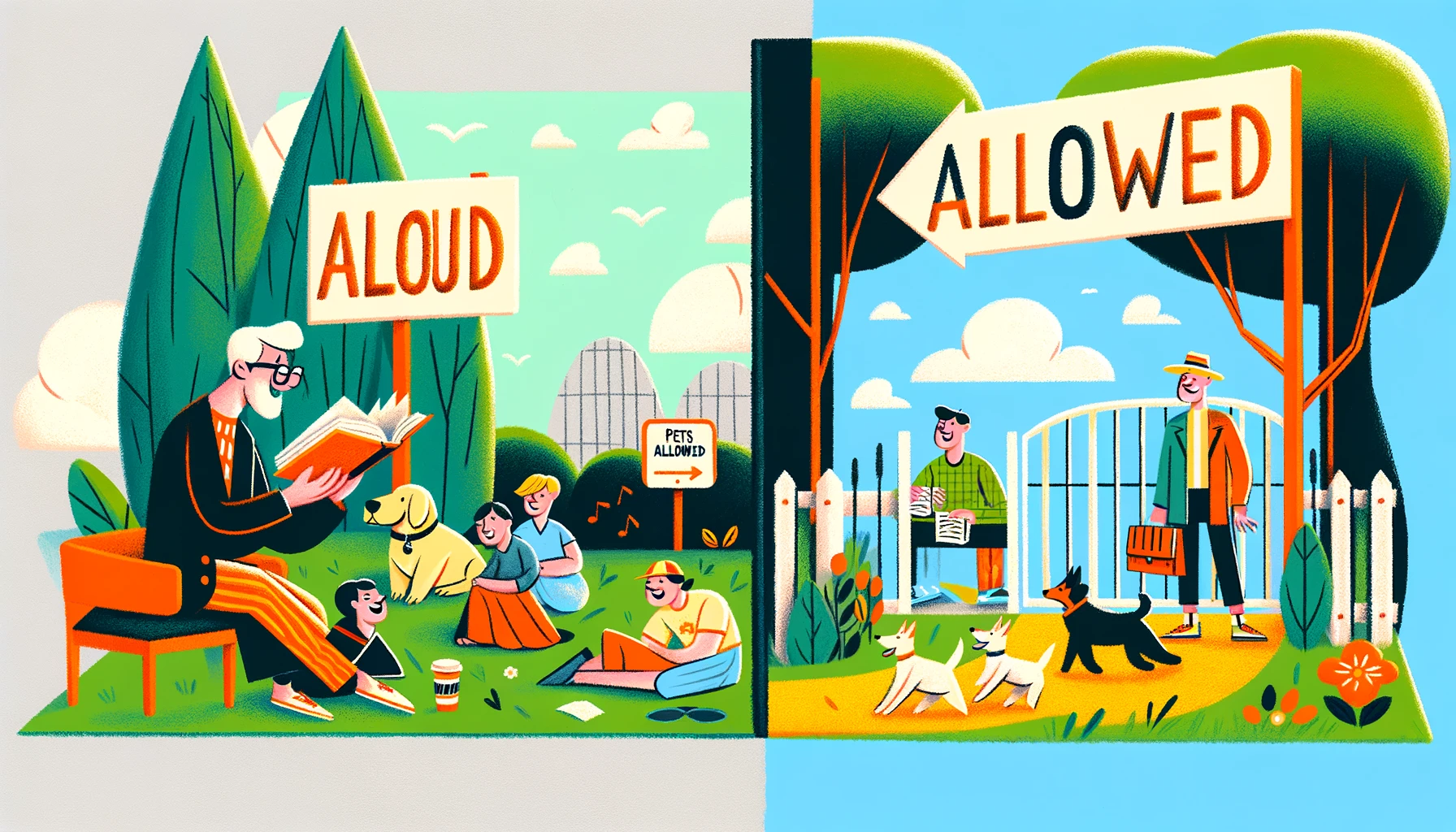
Editly Etymology: aloud vs allowed
Over the course of their careers as editors, proofreaders, and humanizers, the experts at Editly have become masters of commonly confused words. In Editly Etymology, they provide a closer look into the horrifying beauty of the English language. This installment investigates a true classic of confusion: aloud vs allowed.
Aloud Definition
Aloud is an adverb that means audible (able to be heard).
Allowed Definition
Allowed is an adjective that means permitted – or the past tense verb form of allow (permit).
Did you catch that? Just to make sure, let’s ask AI to help us generate a visual representation of each of the words.
Aloud = audible.

Allowed = permitted.

Aloud Root
Middle English, from Old English.
Allowed Root
Middle English, from Old French and from Latin.
Who is to Blame for this Confusion?
In this case, the words have two distinct origins. So, it seems that the blame lies solely on the tongues of English speakers who have morphed these two words into the same pronunciation over time.
AI Text on Aloud
The word "aloud" has a straightforward but interesting history in the English language, primarily rooted in Old English. Here's a detailed look at its etymological journey:
- Old English Origins: "Aloud" comes from the Old English phrase "on hlúde," which directly translates to "in a loud voice." This phrase was composed of "on" (in) and "hlúde," which is the dative of "hlúd" (loud).
- Middle English Development: As Old English evolved into Middle English, the phrase "on hlúde" transformed phonetically and morphologically. It became "alowde" or "aloud" in Middle English. The change involved the dropping of the "n" in "on" and the fusion of the words into a single form.
- Stabilization of Form and Meaning: By the time of Middle English, "aloud" had stabilized both in form and meaning, used to describe the action of speaking in a loud voice. Its meaning was straightforward and has remained relatively unchanged into modern English.
- Modern English Usage: Today, "aloud" continues to mean "out loud" or "audibly," used to describe something that is done with enough volume to be heard, typically in the context of speaking or reading.
The history of "aloud" is a good example of how English words can evolve through slight phonetic changes and shifts in word construction from older linguistic stages, while still retaining their original meaning quite clearly. This stability in meaning, especially for such a functionally simple and everyday concept, is somewhat typical for words describing basic actions and characteristics. (245 words)
Humanization of AI Text on Aloud
"Aloud" has a straightforward but interesting history in the English language. Here's a more detailed look at its etymological journey:
- Old English Origins: "Aloud" comes from the Old English phrase "on hlúde," directly translating to "in a loud voice." This phrase was composed of "on" (in) and "hlúde," the dative of "hlúd" (loud).
- Middle English Development: The phrase "on hlúde" transformed phonetically and morphologically, becoming "alowde" or "aloud" in Middle English. The change involved the dropping of the "n" in "on" and the fusion of the words.
- Stabilization of Form and Meaning: In Middle English, "aloud" stabilized both in form and meaning, used to describe the action of speaking in a loud voice.
- Modern English Usage: "Aloud" continues to mean "out loud" or "audibly," used to describe something that is done with enough volume to be heard.
"Aloud" is a good example of how English words can evolve through slight phonetic changes and shifts in word construction from older linguistic stages, while still retaining their original meaning quite clearly. (173 words)
Result of Changing the AI Text to Human Text
While the AI text is repetitive and overlapping in its sections, the humanized text is concise and straightforward. Measuring the effect in a more precise way, humanization has reduced the text from 245 words to 173 words—or by more than 29%—without losing any essential meaning.
AI Text on Allowed
The word "allowed" in English originates from a combination of Old English and Middle English linguistic developments, particularly through changes in law and societal customs over time. Here’s how it evolved:
- Old English Roots: The roots of "allowed" can be traced back to the Old English period, although the direct predecessor of the word as we know it comes slightly later. The core concept stems from the Old English verb "ālȳfan" or "lēfan," which meant to permit or to grant permission, often in a legal or formal context.
- Middle English Development: As the English language evolved into Middle English, the verb transformed into "allowen," influenced by the Old French word "alouer," which also meant to approve or permit. This Old French term itself derived from the Latin "allaudare," a compound of "ad-" (to) and "laudare" (to praise), and carried the sense of praising or commending, which then naturally extended to approving.
- Legal and Economic Contexts: The usage of "allow" and "allowed" in English was heavily influenced by legal and economic contexts, where it referred to the official sanctioning or approval of certain actions, behaviors, or entitlements. This usage is still common in contexts like financial allowances or permitted actions under law.
- Modern Usage: Today, "allowed" retains this sense of permission or approval but is used in a broader range of contexts, both formal and informal. It can refer to what is permitted by law, rules, or personal or societal standards.
The word "allowed" illustrates the linguistic process where English integrates terms from other languages (in this case, French and Latin) and adapts them into its lexicon, reflecting broader social and legal developments as the language evolved. (280 words)
Humanization of AI Text on Allowed
“Allowed" originates from a combination of Old English and Middle English linguistic developments. Here’s how it evolved:
- Old English Roots: "Allowed" can be traced back to the Old English period, although the direct predecessor of the word as we know it came slightly later. The core concept stems from the Old English verb "ālȳfan" or "lēfan," which meant to permit or to grant permission, often in a legal or formal context.
- Middle English Development: The verb transformed into "allowen," influenced by the Old French word "alouer," which also meant to approve or permit. This term derives from the Latin "allaudare," a compound of "ad-" (to) and "laudare" (to praise). It carried the sense of praising or commending, which then extended to approving.
- Legal and Economic Contexts: Usage in English was heavily influenced by legal and economic contexts, where it referred to the official sanctioning or approval of certain actions, behaviors, or entitlements.
- Modern Usage: "Allowed" retains this sense of permission or approval but can more broadly refer to what is permitted by law, rules, or personal or societal standards.
"Allowed" illustrates the linguistic process where English integrates terms from other languages and adapts them into its lexicon. (201 words)
Effect of Humanizing the AI Text
Humanization has affected the AI content significantly, making it more concise through better diction and the elimination of repetition. This concision can be measured mathematically, as humanization has reduced the word count from 280 words to 201 words—or by more than 28 percent.
The Takeaway
Whether it’s for aloud or allowed, the best AI humanizer does, in fact, turn out to be a human. So, if you need any help to humanize your AI content, don’t wait to get started on Editly.


Paul S.
Online editing, proofreading, and rewriting for both human and AI text. Specialties include admissions essays, academics, business, blogs, and ChatGPT to human text. Chief editor at Editly AI.